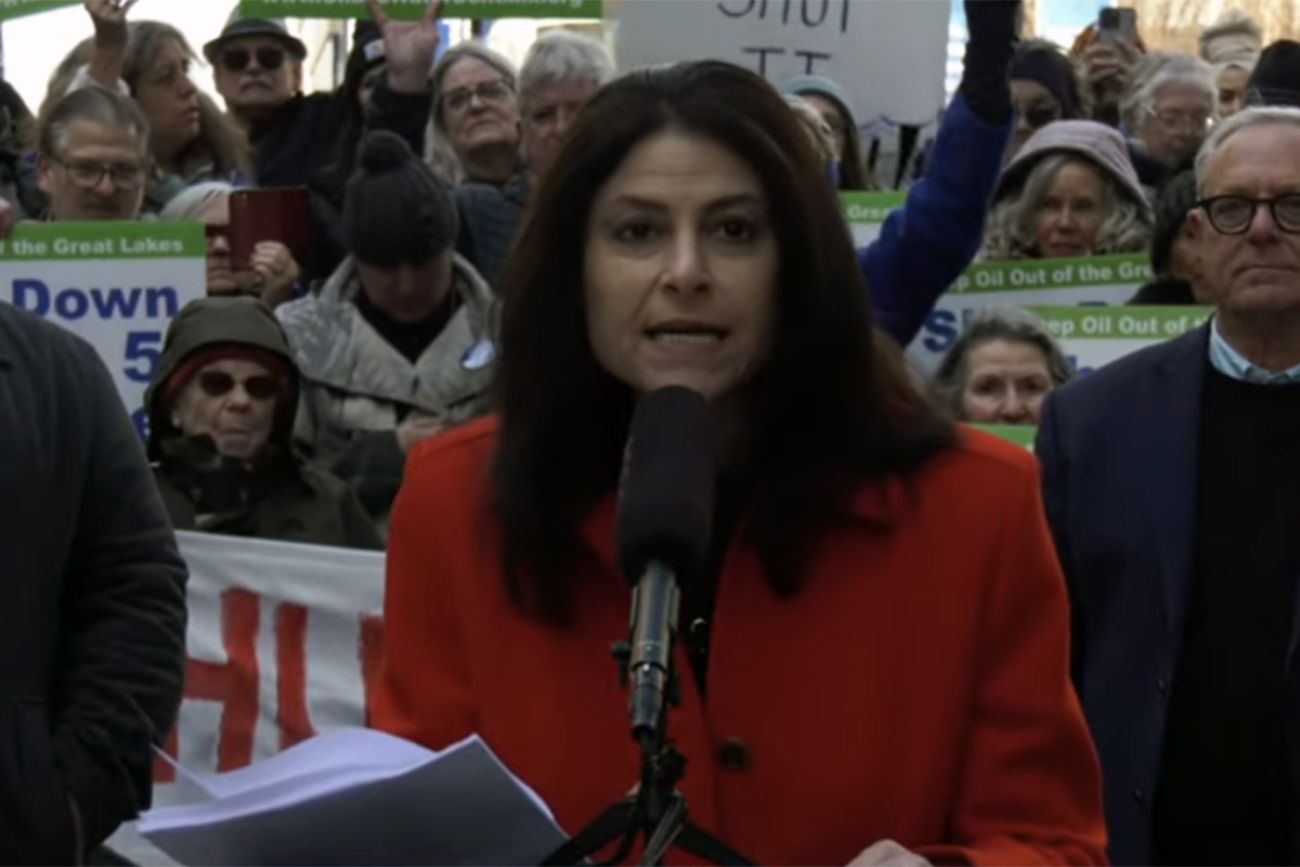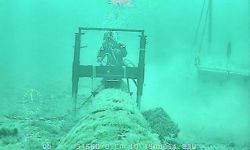Five years into Line 5 fight, Nessel fears having to ‘start all over again’

- Line 5 dispute continued in Cincinnati Thursday, where Michigan Attorney General’s office argued the case should be in state court
- Enbridge attorneys have argued the federal government, not the state, is the main authority on pipeline regulation
- Nessel said Thursday the state would have to “start all over” if the case remains in federal court
Nearly five years into a protracted legal battle over the Line 5 oil pipeline in the Straits of Mackinac, Michigan Attorney General Dana Nessel fears that keeping the case in federal court would drag the case out even longer.
At a federal appeals court hearing in Cincinnati Thursday, Nessel argued that ongoing litigation between the state of Michigan and Enbridge — the owner of Line 5 — belongs in state courts, where she initially filed the 2019 lawsuit to close the pipeline due to potential oil spill hazards.
In 2021, attorneys for Enbridge argued the state has no authority to order the pipeline closed because pipeline safety regulation is a federal matter. U.S. District Judge Janet Neff agreed in 2022, chiding state lawyers for attempting to “perpetuate a forum battle.”
Related:
- Michigan regulators approve key permit for Enbridge Line 5 tunnel
- Enbridge: Federal review of Line 5 tunnel permit is ‘inexplicably lethargic’
- Judge orders segment of Enbridge's Line 5 shut down and moved off Native American land
Nessel was allowed to appeal, and told Bridge Michigan ahead of Thursday’s court hearing that she’s “even more concerned” about the safety of the decades-old pipeline now than when she initially brought the suit, noting a federal trial would potentially delay resolution for years.
“We're not going to stop litigating just because it's in federal court,” Nessel, a second-term Democrat, told Bridge. “It's just that really, we'd be in a place where we'd have to start all over again.”
The issue of which court holds jurisdiction is now a critical detail in the legal battle over whether Enbridge can continue operating Line 5.
In general, legal scholars have said, Nessel is more likely to prevail if the case is heard in state court, while Enbridge is more likely to prevail in federal court.
That’s because federal courts are generally more supportive of federal oversight while state courts are more likely to uphold states’ authority. Federal courts also tend to lean more conservative, while Michigan’s highest court has a 4-3 majority of Democratic appointees.
Enbridge attorney Alice Loughran argued in court Thursday that threats by Michigan officials to close the pipeline “generated a significant foreign affairs controversy” that prompted the Canadian government’s involvement in the dispute.
Loughran argued that the “exceptional circumstances” of international interest over Line 5 and federal laws governing pipeline safety regulations make federal courts the best venue for resolving the question over whether the pipeline can stay open.
State lawyers argue Enbridge missed a key deadline to shift the case out of Ingham County and that Michigan has a right to enforce its own laws in state courts.
Nessel contends the dispute is about more than just the pipeline. She’s concerned the case could set a precedent for state-level litigants seeking a more favorable venue at the federal level.
“Enbridge doesn't get two bites at the apple,” she said. “They don't get to litigate in state court, see how it's going to decide whether or not they think it's going to be a favorable ruling, and before they get an unfavorable ruling, move over to federal courts. It's a delaying tactic.”
Nessel and Gov. Gretchen Whitmer, a fellow Democrat, have vowed since their first campaigns for office in 2018 that shutting down the Canada-based Enbridge’s Line 5 pipeline would be a top priority.
Both have tried, but so far, their efforts have failed. Enbridge continues to use the pipeline to transport petroleum across the bottom of the straits while preparing to build a tunnel that would house them instead.
As the issue continues to move through the courts, some Line 5 opponents have pressured President Joe Biden’s administration to shut down the pipeline, while supporters have applied similar pressure to keep it open.
So far, the Biden administration has hesitated to publicly weigh in on the pipeline fight, instead meeting in private negotiations with Canadian officials, who have twice invoked a 1977 treaty governing cross-border pipelines in response to efforts to shut Line 5 down.
Michigan Environment Watch
Michigan Environment Watch examines how public policy, industry, and other factors interact with the state’s trove of natural resources.
- See full coverage
- Subscribe
- Share tips and questions with Bridge environment reporter Kelly House
Michigan Environment Watch is made possible by generous financial support from:
Our generous Environment Watch underwriters encourage Bridge Michigan readers to also support civic journalism by becoming Bridge members. Please consider joining today.
See what new members are saying about why they donated to Bridge Michigan:
- “In order for this information to be accurate and unbiased it must be underwritten by its readers, not by special interests.” - Larry S.
- “Not many other media sources report on the topics Bridge does.” - Susan B.
- “Your journalism is outstanding and rare these days.” - Mark S.
If you want to ensure the future of nonpartisan, nonprofit Michigan journalism, please become a member today. You, too, will be asked why you donated and maybe we'll feature your quote next time!






